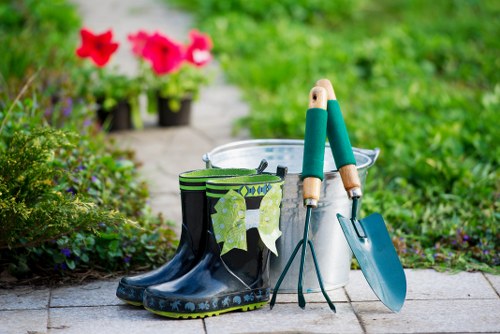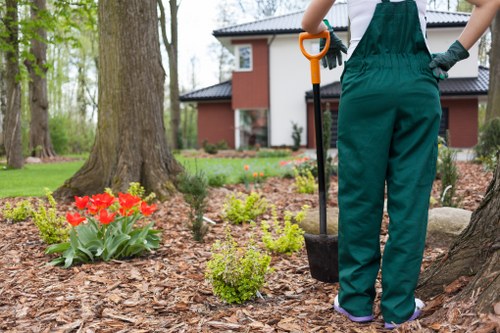Expert Guide to Garden Fence Installation in Mill Hill

Installing a garden fence in Mill Hill is a fantastic way to enhance the beauty, security, and functionality of your outdoor space. Whether you’re looking to define your property boundaries, add privacy, or create a space for your children and pets to play safely, a well-installed fence can make a significant difference.
Mill Hill, with its charming homes and lush gardens, offers a unique environment for garden fence installation. The area's diverse architectural styles and green spaces mean that there's a wide range of fencing options available to suit any property.
Choosing the right type of fence is crucial. From classic wooden fences that offer a traditional look to modern metal fences that provide durability and security, the options are endless. Each type has its own set of benefits and considerations, making it essential to assess your specific needs before making a decision.

Benefits of Garden Fencing
Garden fencing offers numerous benefits that go beyond mere aesthetics. Here are some key advantages:
- Privacy: A fence can provide a secluded space, allowing you to enjoy your garden without prying eyes.
- Security: It acts as a barrier to keep unwanted visitors and animals out of your garden.
- Boundary Definition: Clearly marks the limits of your property, preventing disputes with neighbors.
- Aesthetic Appeal: Enhances the visual appeal of your garden, adding character and charm.
- Wind Protection: Provides shelter from strong winds, protecting plants and outdoor seating areas.
These benefits make garden fencing a valuable addition to any property in Mill Hill, contributing to both the functionality and the overall ambiance of your garden.
Moreover, a well-chosen fence can complement the existing landscape, creating a harmonious balance between the natural and built environments.

Choosing the Right Fence Material
Selecting the appropriate material for your garden fence is a critical decision that impacts both the appearance and longevity of the fence. Here are some popular options available in Mill Hill:
- Wood: Offers a natural and traditional look. Wood fences can be painted or stained to match your garden’s style. However, they require regular maintenance to prevent decay and weather damage.
- Metal: Provides excellent durability and security. Options include wrought iron, aluminum, and steel. Metal fences are low maintenance and can be designed in various styles, from ornate to sleek and modern.
- PVC: A cost-effective and low-maintenance alternative to wood. PVC fences are available in various colors and styles and are resistant to weather conditions.
- Composite: Made from a combination of wood fibers and plastic, composite fences offer the appearance of wood with enhanced durability and minimal maintenance.
- Bamboo: An eco-friendly option that adds a unique and exotic touch to your garden. Bamboo fences are lightweight and sustainable but may require treatment to resist pests and weathering.
Each material has its own set of advantages and drawbacks, so it’s important to consider factors such as budget, maintenance requirements, and the desired aesthetic when making your choice.
Additionally, the local climate in Mill Hill should be taken into account. For instance, metal and PVC fences are more resistant to the damp conditions common in this area compared to untreated wood.

Installation Process
Proper installation is key to ensuring that your garden fence is both functional and long-lasting. Here’s an overview of the typical installation process in Mill Hill:
- Planning and Measurement: Determine the exact location of your fence. Measure the area to calculate the amount of material needed and to ensure accurate placement.
- Obtaining Permits: Check local regulations and obtain any necessary permits before beginning installation. Mill Hill may have specific guidelines regarding fence height, materials, and placement.
- Laying the Foundation: Start by digging post holes at regular intervals. The depth and spacing depend on the type of fence and the material used.
- Installing Posts: Set the fence posts in concrete to ensure stability. Make sure they are plumb (vertically straight) and level with each other.
- Attaching Panels or Rails: Once the posts are secure, attach the fence panels or rails according to the chosen design. Ensure that they are evenly spaced and firmly connected.
- Finishing Touches: Apply any final treatments, such as paint or stain for wooden fences, to protect the material and enhance its appearance.
Hiring a professional installer can help ensure that the process is carried out efficiently and correctly, especially if you’re unfamiliar with fencing techniques or lack the necessary tools.
Professional installers in Mill Hill are familiar with local building codes and can provide valuable insights into the best materials and designs for your specific needs.

Cost Considerations
The cost of garden fence installation in Mill Hill can vary widely depending on several factors:
- Material: Different materials come with different price points. Wood is generally more affordable, while metal and composite materials tend to be pricier.
- Length and Height: The size of the area to be fenced affects the total cost. Longer and taller fences require more materials and labor.
- Design Complexity: Intricate designs with decorative elements will cost more than simple, straightforward fences.
- Labor: Hiring professional installers adds to the cost, but ensures a high-quality and durable fence.
- Additional Features: Gates, lighting, and other custom features can increase the overall expense.
On average, homeowners in Mill Hill can expect to spend between £30 to £100 per meter for fence installation, depending on the materials and complexity of the project.
It’s advisable to obtain multiple quotes from local installers and compare their offerings. This ensures that you get the best value for your investment while meeting your specific fencing requirements.
Additionally, consider the long-term maintenance costs associated with different materials to make a well-informed decision that aligns with your budget and expectations.
Nearby Areas for Garden Fence Installation in Mill Hill
Mill Hill is surrounded by several neighboring areas that also benefit from specialized garden fence installation services. Here are some of the closest areas:
- Edgware Known for its suburban charm, Edgware residents often seek durable and stylish fences to complement their spacious gardens.
- Cricklewood With a mix of residential and commercial properties, Cricklewood homeowners look for versatile fencing solutions.
- Hendon Hendon offers a blend of modern and traditional homes, requiring a variety of fencing styles to match aesthetic preferences.
- Whetstone This area is popular for its large gardens and parks, making fence installation a common request for privacy and security.
- Temple Fortune: Known for its leafy streets, Temple Fortune residents prefer natural materials like wood and bamboo for their gardens.
- Mill Hill Broadway: As a central hub, Mill Hill Broadway requires efficient and quick fence installation to cater to busy homeowners.
- West Hendon West Hendon’s diverse housing styles demand a wide range of fencing options, from classic to contemporary.
- Tenor House: With its proximity to educational institutions, Tenor House often seeks budget-friendly fencing solutions.
- East Finchley East Finchley combines historic and modern elements, requiring fencing that bridges both styles.
- Colindale Colindale’s growing residential areas need robust and secure fencing options to support expanding communities.
- Toll Gardens: Toll Gardens residents prioritize aesthetic appeal, favoring decorative fences that enhance their garden’s beauty.
- Burnt Oak Burnt Oak’s spacious properties often require long-lasting and high-quality fences to enclose extensive gardens.
- Queensbury With its vibrant community, Queensbury homeowners look for unique and customizable fencing solutions.
- Kingsbury Kingsbury’s blend of urban and suburban areas demands versatile fencing installations to suit different property types.
Maintenance Tips for Your Garden Fence
To ensure your garden fence remains in excellent condition for years to come, regular maintenance is essential. Here are some tips:
- Regular Cleaning: Remove dirt, debris, and algae buildup by washing your fence periodically with mild soap and water.
- Inspection: Check for any signs of damage, such as loose panels, broken posts, or rust on metal fences. Address issues promptly to prevent further deterioration.
- Painting and Staining: For wooden fences, apply paint or stain every few years to protect against weather damage and maintain appearance.
- Weatherproofing: Apply sealants or protective coatings to wood and metal fences to guard against moisture and sun exposure.
- Vegetation Control: Keep plants and vines trimmed to prevent them from damaging the fence structure.
- Lubrication: For fences with moving parts, such as gates, regularly lubricate hinges and latches to ensure smooth operation.
Proper maintenance not only extends the lifespan of your fence but also keeps it looking attractive and functional, enhancing the overall appeal of your garden.
By dedicating a small amount of time each year to fence upkeep, you can avoid costly repairs and maintain a beautiful outdoor space.
Environmental Considerations
When selecting materials and designing your garden fence, it’s important to consider environmental factors. Sustainable choices can reduce your garden’s ecological footprint and promote biodiversity.
Opting for recyclable materials like metal and PVC helps minimize waste, while natural materials such as wood and bamboo offer renewable options. Additionally, choosing sustainably sourced wood ensures that your fence production supports responsible forestry practices.
Incorporating living fences or green walls can further enhance environmental benefits by providing habitats for local wildlife and improving air quality.
Hiring the Right Professional
Finding a reputable fence installer in Mill Hill is crucial for achieving the desired results. Here are some tips for selecting the right professional:
- Experience: Look for installers with significant experience in garden fence installation, particularly in the Mill Hill area.
- Portfolio: Review previous projects to gauge the quality and style of their work.
- References: Ask for testimonials or references from past clients to understand their satisfaction levels.
- Licensing and Insurance: Ensure that the installer holds the necessary licenses and insurance to protect against potential liabilities.
- Warranty: A good installer should offer warranties on both materials and labor, providing peace of mind for your investment.
- Cost Transparency: Choose professionals who provide clear and detailed quotes, outlining all costs involved.
Taking the time to research and select the right professional ensures that your garden fence installation is completed efficiently and to a high standard.
Additionally, a skilled installer can offer valuable advice on design choices and maintenance practices tailored to your specific needs.
Enhancing Your Garden with Fencing
A well-installed fence can be the foundation for transforming your garden into a beautiful and functional space. Here are some ideas to enhance your garden with fencing:
- Vertical Gardens: Use your fence as a support for climbing plants, creating a lush vertical garden that adds greenery and privacy.
- Decorative Elements: Incorporate decorative panels, latticework, or metal art to add unique visual interest to your fence.
- Lighting: Install solar-powered or LED lights along your fence to illuminate your garden at night, creating a warm and inviting atmosphere.
- Seating Areas: Position your fence to create private seating nooks or outdoor lounges within your garden.
- Storage Solutions: Utilize fence space for mounting hooks, shelves, or storage units to keep garden tools and accessories organized.
By integrating these features, your garden fence can serve multiple purposes, enhancing both the functionality and beauty of your outdoor area.
Personalizing your fence design to reflect your style and garden’s needs ensures that it becomes a valuable and integral part of your landscape.
Conclusion
Garden fence installation in Mill Hill is a worthwhile investment that can significantly improve your outdoor living space. By carefully selecting the right materials, design, and professional installer, you can achieve a fence that not only meets your practical needs but also enhances the aesthetic appeal of your property.
Whether you seek privacy, security, or simply wish to add a touch of elegance to your garden, a well-installed fence can transform your outdoor area into a serene and beautiful retreat.
Take the time to plan and execute your garden fence project thoughtfully, ensuring that it aligns with your personal preferences and the unique characteristics of your home and garden.
Frequently Asked Questions
1. How long does it take to install a garden fence in Mill Hill?
The installation time varies based on the fence type, length, and complexity of the design. On average, a standard fence installation can take anywhere from a few days to a week.
2. Do I need a permit for garden fence installation in Mill Hill?
Permit requirements depend on the fence’s height and location. It’s best to check with the local council in Mill Hill to determine if you need a permit before starting your project.
3. What maintenance does a wooden fence require?
Wooden fences need regular maintenance, including cleaning, staining or painting, and inspections for rot or damage. Proper upkeep helps prolong the fence’s lifespan.
4. Can I install a garden fence myself?
While it’s possible to install a fence yourself, hiring a professional ensures that the job is done correctly and efficiently, especially for larger or more complex projects.
5. What is the most durable fencing material?
Metal fences, particularly those made from steel or aluminum, are among the most durable options. They offer excellent longevity and require minimal maintenance compared to other materials.